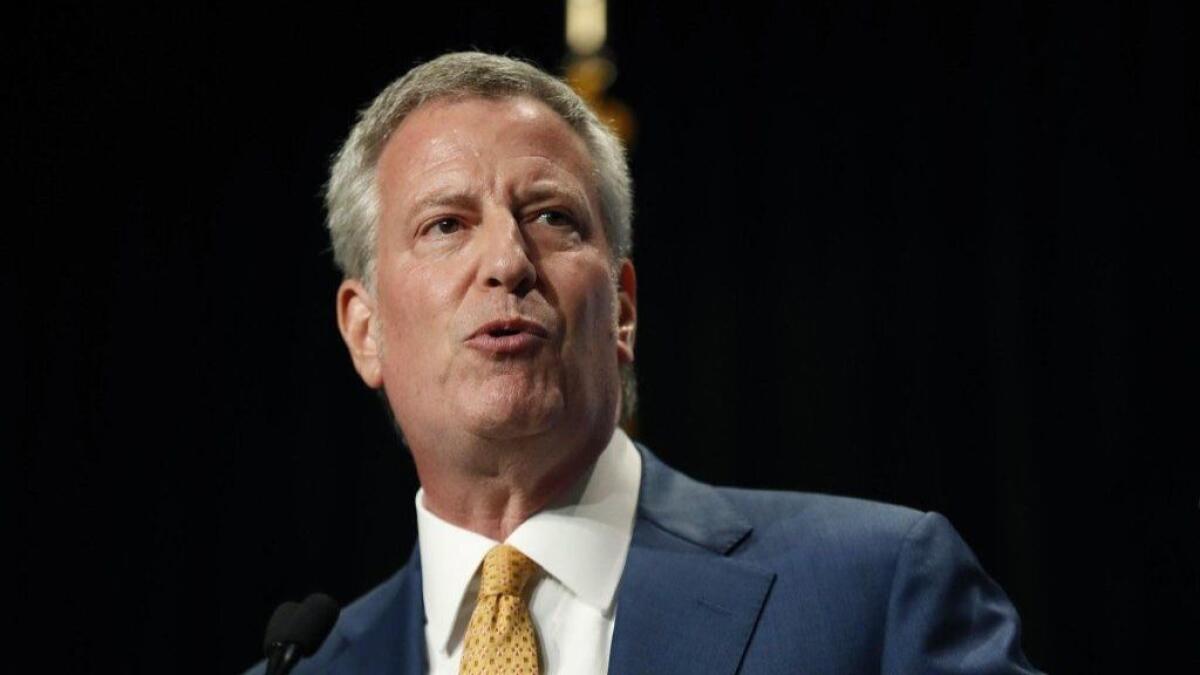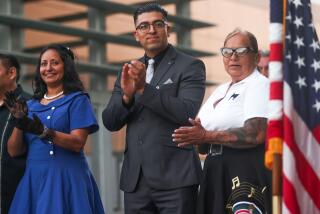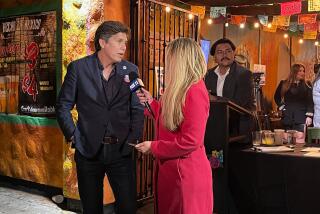New York Mayor Bill de Blasio takes his low popularity to the national stage

Some days it seems nobody wants New York’s mayor to run for president — other than New York’s mayor.
Bill de Blasio’s constituents appear to waver from being amused to appalled by his White House bid. Some of his past confidants have signaled they might sooner enlist with the LaRouche movement than take a job on his campaign.
The New York Post illustrated the announcement that he’d entered the race with a photo of people laughing.
“I’ve not met anyone who has had more than an ‘I guess’ kind of reaction,” said KC Brown, a 31-year-old from Brooklyn who works in environmental advocacy. She detoured from a Nebraska City, Neb., work trip to Iowa to catch an event with Sen. Elizabeth Warren (D-Mass.) last weekend. She had no interest in catching her own mayor, who was campaigning nearby, despite trying to keep an open mind.
“If Mayor Pete is running out of like such a small town, I can see the case” for De Blasio’s candidacy, she said. “I mean, I’m not excited about it. But yeah.”
Mayor Pete would be Pete Buttigieg, the leader of South Bend, Ind., population 100,000. He is crushing the mayor of the nation’s largest city in recent polls. So is almost everyone else in the race. In a recent Des Moines Register/CNN poll of more than 600 Iowans, not a single one chose De Blasio as their first choice for president. Or their second.
The only other candidate who did so poorly was Wayne Messam, the mayor of Miramar, Fla.
Still, De Blasio soldiers on.
“I didn’t come today with a bunch of position papers,” he told a few dozen diners tucking into stacks of pancakes the size of hubcaps on the sunny patio of Newton’s Paradise Cafe in Waterloo on Sunday. “I came today with a bunch of achievements. I came today to tell you about things that have actually happened, that I have led in the nation’s largest city.”
That’s the crux of De Blasio’s case: that voters should overlook the feuds he has sparked in New York — with the governor he loathes, with the tabloids he calls “fake news,” with the voters fed up that he has government cars chauffeur him 11 miles every morning from Gracie Mansion to a Park Slope gym where he sits on a stationary bike — and look at what he’s actually done.
“He has done so much and so many of the things a lot of these candidates are just talking about,” said Steve Jarding, a senior advisor to the De Blasio campaign. “They say we need to raise the minimum wage in this country, we need universal pre-K in this country, we need universal healthcare in this country. He has done those things.”
Indeed, the mayor’s resume is nothing to sneeze at. But the accomplishments are weighed down with baggage that irks New Yorkers: the crumbling subway system, the scandals sparked by the mayor’s fundraising, his political ambition at a time when many New Yorkers feel he has too much unfinished business at home.
De Blasio is hanging in there for the same reasons he did during his victorious 2013 mayoral campaign, which pundits prematurely declared a lost cause. He’s been the underdog in all the most important races he’s won, even those where the presumed front-runner’s campaign didn’t implode in a sexting scandal, as was the case in 2013 with Anthony Weiner.
When he first ran for mayor, De Blasio lamented a “tale of two cities” — vowing to make life better for downtrodden and struggling New Yorkers. But income inequality has widened during his tenure, and with the mayor seemingly gripped by Potomac fever, some New Yorkers now see a tale of two De Blasios.
“There is the tale of the first term, when he was working hard to provide a vision for the city, and the tale of the second term, where he doesn’t even seem to like us,” said Christina Greer, a political science professor at Fordham University. “It seems a classic case of the mayor got bored with the job and wants a better one.”
De Blasio frames things differently. He compares himself to a CEO of a massive, successful corporation who doesn’t need to be chained to headquarters. “I’ve been able to run it wherever I am,” he said. “I know after 5 ½ years how to do it.”
2020: Key dates on the presidential election calendar »
Some of the irritation New Yorkers have with De Blasio is following him on the campaign trail. In Waterloo, he was confronted by reporters asking why he was glad-handing and speechifying in Iowa instead of marching in New York City’s storied Puerto Rican Day Parade. Was being away the reason he couldn’t offer details about a major overnight Bronx fire? The candidate grew impatient.
“So, there’s a thing called the internet. You know, I get emails, I get phone calls all the time,” he said. “Look, I’ll happily answer this 1,000 more times.”
He may have to.
De Blasio shows every sign of suffering from a curse that has afflicted most every New York mayor who has aspired to higher office since 1868. The city’s tabloids are littered with the political carcasses of mayors whose aspirations were crushed as soon as they tried to set foot outside the city.
Rudolph W. Giuliani flamed out quickly in his bid to win the GOP presidential nomination in 2008, his vision of snowbirds in Florida propelling him to victory dashed as he got destroyed in early-voting states.
Michael R. Bloomberg kept talking like he would run and then balking when no signs emerged showing the country was clamoring to put him in charge. Ed Koch’s humbler ambition of being New York governor was shut down by voters. The list goes on.
Even if New Yorkers weren’t already notoriously dissatisfied, it can prove impossible to emerge politically viable after managing a city so unwieldy, with social and public works challenges so intractable and a media so vicious.
“It is a no-win situation,” said Jim Rich, the former editor of the New York Daily News, whose covers featuring De Blasio have been brutal. “No matter how much you do right, there are still a boatload of things that go wrong and you will be blamed.”
Add to that the challenge of winning the hearts of voters in the center of the country. “There is a large chunk of them that hate New York City,” Rich said. “They hate everything it represents.”
It doesn’t help that De Blasio has a penchant for self-inflicted wounds. He’s so loathed by New York’s police union that when he visited South Carolina, the union’s president warned the sister organization down South that De Blasio would be “an unmitigated disaster… for any American who wants a functioning government.” A pre-campaign launch event at Trump Tower went sideways when protesters — and the operator of the building’s sound system — outwitted the mayor and the media dismissed the effort as opportunistic and incompetent.
De Blasio’s actual launch was spoiled when invitations went out for an event in Iowa that listed him as already in the race, albeit with his name spelled wrong (something that happens a lot to the mayor).
De Blasio’s complaints about news coverage have moved both the Post and the News to publish covers likening the mayor — who used the term “fake news” to describe unfavorable coverage — to Trump. A Post cover affixed Trump’s pompadour to De Blasio’s head.
The mayor styles himself as the only candidate with the street smarts required to wound Trump, but De Blasio’s tough talk and nickname for the president, “Con Don,” are hardly catching fire.
Even a new Siena College poll showing Trump’s favorability rating in New York state at only 34% wasn’t good news for De Blasio.
The mayor’s favorability rating in the state? Five points worse.
Halper reporter from Washington and Mehta reported from Iowa. Times staff writer Janet Hook contributed to this report from Washington.
More to Read
Sign up for Essential California
The most important California stories and recommendations in your inbox every morning.
You may occasionally receive promotional content from the Los Angeles Times.











